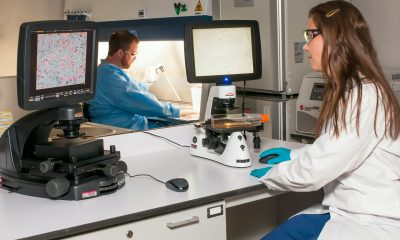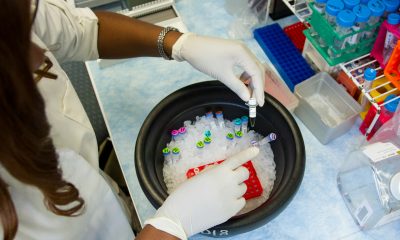Biotech
AstraZeneca and Scientific Societies Unite for Multidisciplinary Care in Cardio-Renal-Metabolic Diseases
AstraZeneca and 13 scientific societies signed a document promoting a multidisciplinary approach to cardio-renal-metabolic diseases. The agreement emphasizes early diagnosis, care coordination, research, awareness, screening, equitable access to treatments, and clinical outcome evaluation. AstraZeneca’s Spain president highlighted the role of public-private collaboration in advancing innovation, diagnostics, and patient care.

AstraZeneca is bringing together 13 scientific societies to sign a document aimed at promoting a multidisciplinary approach to cardio-renal-metabolic diseases. Under the document, the signatory societies commit to a comprehensive and personalized approach to patient care, prioritizing early diagnosis of these conditions, improving care coordination, and providing ongoing training for healthcare professionals.
The key elements outlined in this document signed by AstraZeneca and the other companies, are coordinated and efficient care among various healthcare professionals; the development of multicenter and multidisciplinary studies that generate solid scientific evidence; the development of joint clinical practice guidelines based on the best available evidence.
Moreover, the document also outlines the implementation of awareness campaigns aimed at the community and patients on the relationship between cardio-renal-metabolic pathologies; the promotion of screening strategies and tools that facilitate the early identification of risk factors; equitable access to innovative treatments and technologies; and the ongoing evaluation of clinical outcomes.
The 13 companies and AstraZeneca commit to improving care coordination for cardio-renal-metabolic diseases
At the signing of the document, Rick R. Suárez, President of AstraZeneca Spain, emphasized that “this meeting is a great opportunity for professionals from different areas to share experiences and knowledge on the care of patients with cardio-renal-metabolic diseases. At AstraZeneca, we are committed to innovation and the development of advanced treatments for these pathologies, and to this end, we consider public-private collaboration in healthcare to be essential, as this alliance allows access to new technologies, improved diagnostic processes, and the care we provide to our patients.”
During the signing of the decalada, Suárez Gonzalo Balbontín Casillas, managing director of the Progress and Health Foundation of the Ministry of Health and Consumer Affairs of the Regional Government of Andalusia, as well as the various representatives of the scientific societies that are part of this agreement: the president of the Spanish Society of Nephrology (SEN), Dr. Emilio Sánchez; the president of the Spanish Society of Endocrinology and Nutrition (SEEN), Dr. Javier Escalada; the representative of the Spanish Diabetes Society (SED), Dr. María José Picón César; the president of the Spanish Society for the Study of Obesity (Seedo), Diego Bellido; the president of the Spanish Society of Internal Medicine (SEMI), Dr. María Montserrat Chimeno Viñas;
Also attending the event organized by AstraZeneca will be the president of the Spanish Society of Cardiology (SEC), Dr. Luis Rodríguez Padial; the representative of the Foundation of the Network of Diabetes Study Groups in Primary Care (RedGDPS), Dr. Javier Cornejo; the representative of the Spanish Society of General and Family Physicians (SEMG), Dr. Manuel Miño; the president of the Spanish Society of Primary Care Physicians (SEmergen); Dr. Jorge Rico, president of the Latin American Society of Nephrology and Hypertension (SLANH); Dr. Juan Esteban Gómez, director of the Inter-American Society of Cardiology (SIAC); Dr. Luisa Moura Branco, member of the Portuguese Society of Cardiology (SPC); and Dr. María Manuela Almeida, member of the Portuguese Society of Nephrology (SPN).
__
(Featured image by RDNE Stock project via Pexels)
DISCLAIMER: This article was written by a third party contributor and does not reflect the opinion of Born2Invest, its management, staff or its associates. Please review our disclaimer for more information.
This article may include forward-looking statements. These forward-looking statements generally are identified by the words “believe,” “project,” “estimate,” “become,” “plan,” “will,” and similar expressions. These forward-looking statements involve known and unknown risks as well as uncertainties, including those discussed in the following cautionary statements and elsewhere in this article and on this site. Although the Company may believe that its expectations are based on reasonable assumptions, the actual results that the Company may achieve may differ materially from any forward-looking statements, which reflect the opinions of the management of the Company only as of the date hereof. Additionally, please make sure to read these important disclosures.
First published in iSanidad. A third-party contributor translated and adapted the article from the original. In case of discrepancy, the original will prevail.
Although we made reasonable efforts to provide accurate translations, some parts may be incorrect. Born2Invest assumes no responsibility for errors, omissions or ambiguities in the translations provided on this website. Any person or entity relying on translated content does so at their own risk. Born2Invest is not responsible for losses caused by such reliance on the accuracy or reliability of translated information. If you wish to report an error or inaccuracy in the translation, we encourage you to contact us

-

 Africa4 days ago
Africa4 days agoAgadir Allocates Budget Surplus to Urban Development and Municipal Projects
-

 Cannabis2 weeks ago
Cannabis2 weeks agoKONOPEX Expo 2026: Celebrating Europe’s New Era of Legal Cannabis
-

 Biotech1 day ago
Biotech1 day agoVolatile Outlook for Enlivex Therapeutics as Investors Await Clinical Catalysts
-

 Impact Investing1 week ago
Impact Investing1 week agoInter IKEA Launches Electric Truck Fleet to Decarbonize Heavy-Duty Logistics in Italy
























